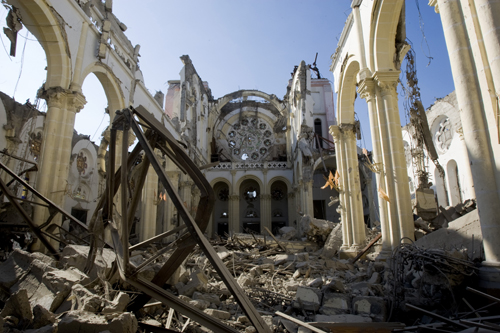Does the Haitian Earthquake Demand a Literary Response?
by Elizabeth Hoover / May 27, 2010 / No comments

Photo: © UNESCO/ Marco Dormino
When the earthquake struck Haiti on Jan. 12, 2010, I had just returned to Pittsburgh from Indiana University to join the staff of Sampsonia Way. I immediately wanted to write about how the disaster affected writers. In order to do that, I had to get a sense of what the literary scene was before the earthquake.
As I began my research, I discovered that information on Haitian literature was hard to come by in the United States. Like many Americans, I knew the name of the novelist Edwidge Danticat, but few other Haitian writers came to mind. Through the help of two invaluable sources—Carrol Coates, professor at Binghamton University, and Jean Jonassaint, professor at Syracuse University—I came to appreciate that the struggle of Haitian writers began long before the earthquake.
Through repressive dictatorships, exploitative American occupation, and endemic poverty, Haitian writers—with tenacity of resourcefulness—have created and sustained a vibrant literary community on the island. It was inspiring to cover the efforts of these writers. I was particularly drawn to the story of Marie Vieux-Chauvet, who spoke out against brutality in her beautiful novellas Love, Anger, Madness.
The story of Haitian writing is not complete without considering the sizable diaspora of writers. Yanick Lahens reflected in 2003 that “exile is one of the dimensions which … gives Haitian culture its coherence.” Writing this article also gave me a chance to explore the importance of diasporic literature. Lahens elected to remain in Haiti and part of her account of the earthquake appears in the article.
One of the issues that came up over and over again was that of the responsibility of the writer to respond to catastrophe. Jonassaint implies that a writer’s first responsibility is to their craft, while others argue that writers have a duty to respond—in their writing—to the needs of their community.
I’d love to hear readers’ comments on this issue. Does the writer have a particular responsibility to society and, if so, what is it? Please use the comment field below.
Click here to read Elizabeth’s bio.




